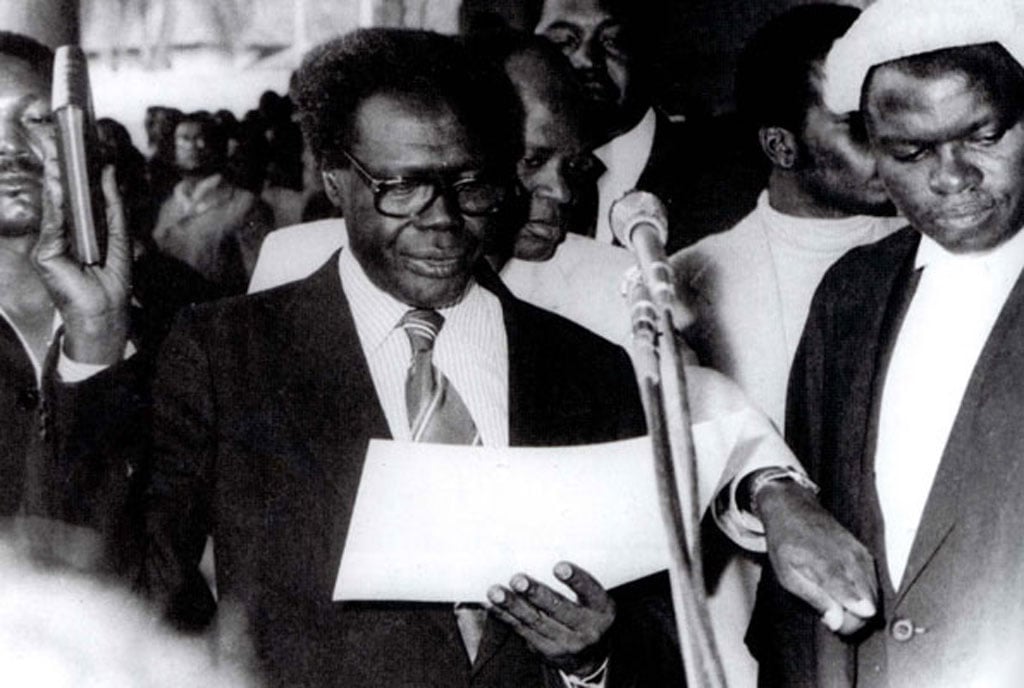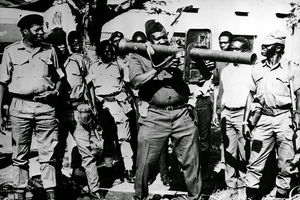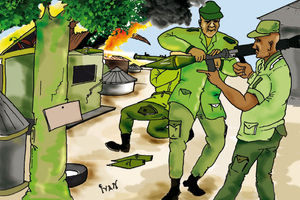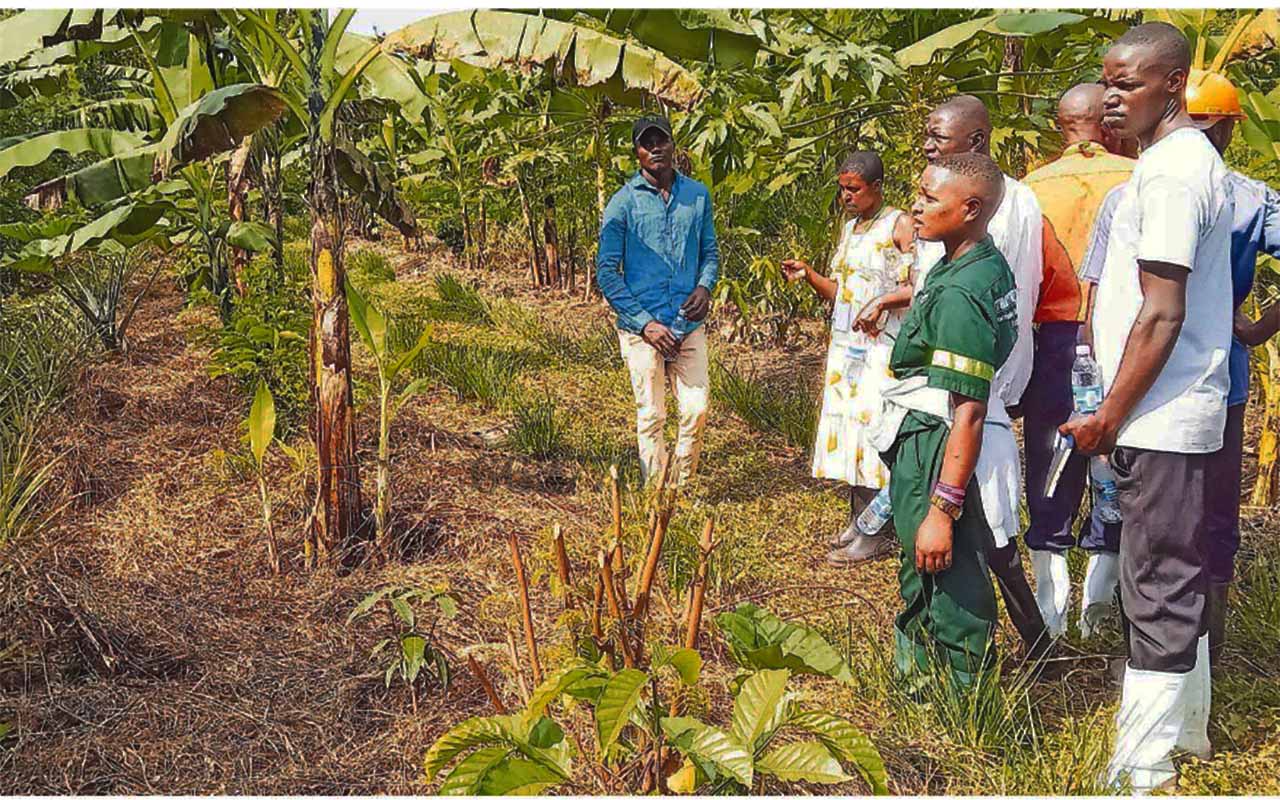
Milton Obote swears in as Uganda’s president in 1980. PHOTO/ FILE
The paper which was prepared by the agency’s Office of African and Latin American Analysis concluded that the Obote II regime was very heavily challenged, and the army was out of control.
Thirty-nine years ago, yesterday, Apollo Milton Obote etched his name into the history books, becoming the first African head of State to be deposed by the army for a second time.
On July 27, 1985, Gen Tito Okello Lutwa and Gen Bazilio Olara Okello brought the curtain down on the Obote II regime. Bazilio Okello was at the time the commander of what was then known as the Northern Brigade of the Uganda National Liberation Army (UNLA), while Tito Okello was the army commander.
CIA foretells
It has, however, since emerged that the Central Intelligence Agency (CIA) of the United States had foretold the collapse of the Obote II regime several months before the coup took place.
A declassified file titled “Obote’s Dimming Prospects”, that was approved for release on January 24, 2012, also expressed fears that such a development could result in an ideological shift that would result in Uganda ditching the capitalistic West for the communist East.
“We cannot discount the possibility of Obote’s removal by coup or assassination—a move, in our judgment, that would push Uganda quickly to the left. Based on what little we know about the ideology and opportunism of likely contenders, almost any successor regime would be less friendly toward the West and probably would move to establish closer ties with the communist states,” the report noted.
Such eventuality, the report further notes, would most likely cause tensions between Uganda and its neighbours.
“This would cause new concern among neighbouring countries such as Kenya, Sudan, and Zaire (now the Democratic Republic of Congo) about security along their borders with Uganda and might prompt some of them to press the United States for increased military aid,” the report further notes.
At the time, Kenya and Zaire were very strong allies of the West. Kenya was home to a US navy base, while Zaire under Mobutu Sese Seko, was a strong front in the US’ and the West’s effort to help the National Union for the Total Independence of Angola (UNITA) oust the Popular Movement for the Liberation of Angola (MPLA) from power in Angola.
Sudan was at the time led by Gen Ja’far Muhammad an-Nimeiry, who had established a one-party state under the one-party Sudanese Socialist Union.
Despite the name, Nimeiry was more allied to the West and survived a pro-Soviet coup attempt early in 1971.
CIA’s assessment of the regime
The paper which was prepared by the agency’s Office of African and Latin American Analysis concluded that the Obote II regime was very heavily challenged. It indicated that the army was out of control on account of the loss of key leaders.
The regime, the report noted, was plagued with internal rivalries, the economy was in shambles and dissidence was rising at an alarming rate.
An army out of control
The file noted that whereas Obote needed the support of the army to hold onto power, its loyalty had become questionable. It adds that he had lost control over the same, with ethnic tensions playing a major role in creating fissures.
“Ethnic rivalries, personal animosities, and even a desire among some of the military to restore [Idi] Amin to power have contributed to internal instability. The security forces on which Obote depends to maintain order are riddled with tribalism, personal rivalries, low morale, corruption, and inefficiency, according to US Embassy sources,” the report notes.
Oyite-Ojok factor
The report pointed out that the demise of David Oyite-Ojok, the army chief-of-staff, in a helicopter crash on December 2, 1983, had led to a deterioration in the security situation in the country.
“The highly respected Ojok was a Langi (Lango)—the same tribe as Obote—and a crucial link between the President and the armed forces. Obote’s safety had depended in part on Ojok’s loyalty and vigorous prosecution of the military’s counterinsurgency efforts. We believe Ojok was the power behind Obote, a potential successor, and the key element in maintaining some semblance of security and order in Uganda,” the file notes.
It adds that Obote’s failure to name an immediate substantive chief-of-staff in the wake of Ojok’s demise pointed to the headache he was facing.
Disgruntled voices
The file further points to disgruntlement among officers and men of the UNLA hailing from the Acholi sub-region over alleged favouritism shown by Obote to his fellow Langi tribesmen within the army, even when the Langi constituted only about 20 percent of the army.
“We believe the president, aware of the Acholi resentment, probably hoped to pacify the Acholi by choosing Gen Tito Okello (as army commander). Acholi grievances persist, but Obote has deprived them of a single, crucial issue about which to unite. He knows, however, that any misstep could precipitate plotting by the Acholi, or an Acholi revolt if another Langi was appointed to the top military post,” it further reads,
It should, however, be remembered that the rapid promotion of Smith Opon Acak, an officer from the Lango sub-region, and his subsequent appointment as the substantive chief-of-staff was one of the reasons the Okellos gave for having moved against Obote.
Broke government
The declassified file further reveals that the Obote II regime found itself faced with serious problems on account of having a bloated army of about 40,000 men that was poorly paid, ill-trained and lacking in discipline.
“Only about 15,000 enlisted or commissioned personnel have received basic training; some 15,000 to 25,000 soldiers in regular and militia units have little or no military training. Obote recognises the problems inherent in his inflated and undertrained force structure but is reluctant to reduce the size of the army for fear of turning large numbers of unemployed armed men loose amid the local population,” the report says.
The US embassy’s estimate at the time was that the government was too broke to pay its suppliers and could also not afford to feed more than 20,000 men.
“In May (1984) Ugandan defence contractors, including those that supply food, ceased deliveries because of non-payment by the government,” the file says.
Preying on the populace
According to the file, the situation precipitated acts of looting on the part of the UNLA.
“As a result, many soldiers stole food and supplies from civilians, and the US embassy reports increased instances where entire villages have been looted. Among the most victimised have been the non-Acholi ethnic groups around Kampala and in southern Uganda,” the file reports.
According to the file, the deep-seated animosity toward the predominantly Acholi army reinforced the soldiers’ inclination to mistreat the populace, thus perpetuating the cycle that had already caused the erosion of support for the government.
It should be remembered that days prior to the coup, the global human rights watchdog, Amnesty International, released a 64-page report in which it detailed claims that the UNLA had been committing serious atrocities against the civilian population in Luweero Triangle in its war against the rebel National Resistance Army (NRA).
The responsibility for some of those atrocities has, however, since become the subject of contention, with several circles now pointing an accusing finger at the NRA.
An article, titled, “Uganda: 2nd Obote Regime,” which was published on the Website of the World Peace Foundation on August 7, 2015, suggests that the NRA had committed some of the atrocities for which the UNLA has always been blamed.
“(President) Museveni’s NRA also targeted civilians to discredit Obote and confuse the population by dressing in UNLA garb… this created even more confusion as to which side was conducting the killings,” the article reads in part.
About the report:
The file noted that whereas Obote needed the support of the army to hold onto power, its loyalty had become questionable. It adds that he had lost control over the same, with ethnic tensions playing a major role in creating fissures.
“Ethnic rivalries, personal animosities, and even a desire among some of the military to restore [Idi] Amin to power have contributed to internal instability. The security forces on which Obote depends to maintain order are riddled with tribalism, personal rivalries, low morale, corruption, and inefficiency, according to US Embassy sources,” the report notes.








